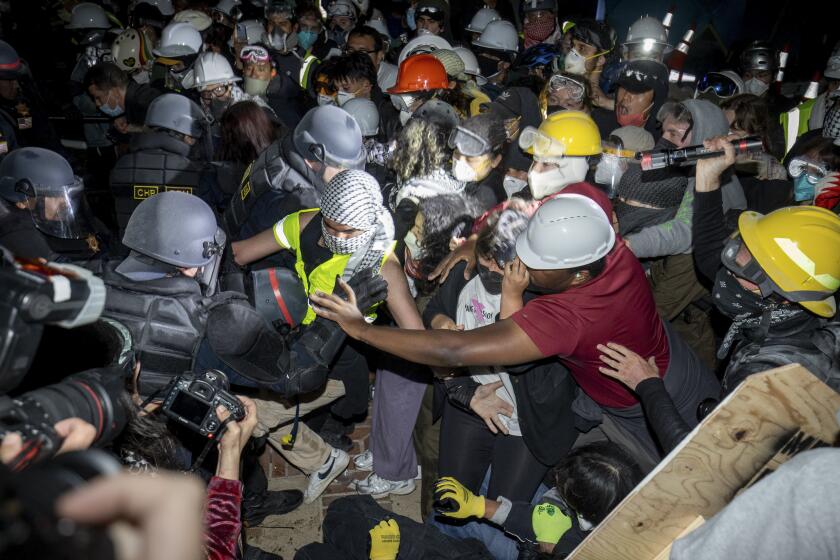Dutch Confirm Possible Spread of Arms Secrets
Two government ministers in the Netherlands acknowledged Monday that highly sensitive nuclear technology developed by a Dutch company may have been transferred to Libya and North Korea along with Iran and Pakistan.
The disclosure in the Dutch parliament marked the first public confirmation of assertions that centrifuge technology for enriching uranium apparently found its way to Libya and North Korea. It was already known that Pakistan and Iran had the technology.
The Dutch officials said it was not clear how the potentially arms-related technology may have been transferred. But diplomats elsewhere said the public comments were likely to increase pressure on Pakistan, which has already been linked to Iran’s capability and is suspected of providing the technology to North Korea and Libya.
U.S. officials have long suspected that Abdul Qadeer Khan, who led the development of Pakistan’s atomic bomb, stole the centrifuge secrets in the 1970s while working for the Dutch company Urenco. He was convicted of the theft, but the verdict was overturned.
Urenco is a British-Dutch-German consortium, and officials said it has not been implicated in the spread of the centrifuge technology.
A Urenco spokesman told the Reuters news agency that the company did not do business with Iran, Libya or North Korea and that the technology may have been passed to those countries by means outside its control.
Centrifuges are used to process uranium into fuel for reactors or fissile material for bombs. Most experts regard obtaining fissile material as the most difficult step in building an atomic bomb.
Evidence of Pakistan’s possible role in transferring centrifuge technology emerged last summer when inspectors from the United Nations’ International Atomic Energy Agency uncovered an extensive enrichment program in Iran based on Urenco’s designs.
After several inspections and protracted negotiations with the agency, Iran conceded in November that it had received centrifuge drawings and components from several middlemen, including Pakistanis, according to diplomats.
Pakistan drew suspicion again last month after Libya announced that it was abandoning its development of chemical, biological and nuclear weapons and opened its doors to inspectors from the United States, Britain and the IAEA.
Diplomats said in recent interviews that IAEA inspectors had been shown two types of centrifuge equipment in Libya. They said the equipment was clearly based on the designs of the Dutch unit of Urenco and its German affiliate.
The designs appeared to have come from Pakistan, although other sources may have helped. The Libyan centrifuge program, the diplomats said, was in its early stages.
Centrifuge cylinders similar to those developed and manufactured by Urenco were visible in photographs taken inside one of the Libyan warehouses and shown to The Times.
American officials have said that Pakistani authorities traded centrifuge enrichment technology to North Korea for missiles and missile technology in the late 1990s.
Little is known about the extent of Pyongyang’s uranium enrichment program, which is an alternative to its production of weapons material from plutonium.
Pakistani authorities have denied transferring nuclear technology to Libya. They also have said that any transfers to North Korea stopped before Gen. Pervez Musharraf came to power in a military coup in October 1999.
But Pakistani officials have conceded that people who were trying to make money might have sold nuclear technology to Iran in the late 1980s and early 1990s.
Pakistani intelligence officials have questioned several senior scientists, including Khan, about Iran’s possession of the technology. Several people remain in custody, including Khan’s personal secretary, Islam ul Haq.
In the Netherlands, Foreign Minister Bernard Bot and Economic Affairs Minister Laurens-Jan Brinkhorst said in written replies to questions from a member of parliament that they were uncertain how the Urenco technology may have reached other countries.
“There are indications now that, in addition to [Iran and Pakistan], North Korea and Libya also possess this type of technology,” they said. “The IAEA and AIVD [Dutch intelligence] are still investigating this.”
Even if Pakistani scientists acted without government knowledge, the transfers of such sensitive technology would raise serious concerns about the effectiveness of Pakistan’s controls over its nuclear facilities, diplomats said.
“Some countries have developed their technology without the system to control it,” said a European diplomat. “Pakistan does not have clean hands if it doesn’t have control over its individuals.”
*
Times wire services contributed to this report.
More to Read
Start your day right
Sign up for Essential California for news, features and recommendations from the L.A. Times and beyond in your inbox six days a week.
You may occasionally receive promotional content from the Los Angeles Times.






